Movie Retrospective: High Noon
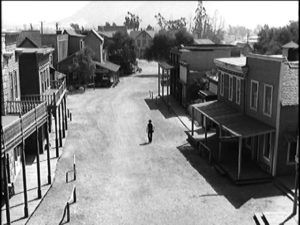
Fred Zinnemann’s 1952 western is an atypical entry in the genre as a whole, but is rightly regarded as one of the best and most influential of its kind. Adapted from the John W. Cunningham short story The Tin Star by scriptwriter Carl Foreman, and starring Gary Cooper, High Noon is a tight, low-key western that is almost entirely bereft of wide panoramas and action sequences. We see very little outside the environs of the town Hadleyville (a settlement in the New Mexico Territory) and the only gun play of note which takes place comes in the climactic moments. The famous song which dominates the score – Do Not Forsake Me, Oh My Darlin’ (as performed by Tex Ritter) – establishes such an understated ambience from the beginning. Three men meet in open country and ride into town. Among them is the highly recognisable face of a young Lee Van Cleef. Their dispositions are restrained, but there is an undercurrent of malice nonetheless. A woman blesses herself as she sees them arrive into Hadleyville; the score by Dimitri Tiomkin strikes up an ominous air. Elsewhere in town the retiring Marshall Will Kane (Cooper) is being wed to a woman named Amy (Grace Kelly) who is a number of years younger than him. He jokes after the ceremony as he hands over his badge – ‘Don’t ever marry a Quaker, she’ll have you running a store.’ We can only guess that part of Will’s reason for departing his post is to comply with his new wife’s pacifistic inclinations. Amy’s beliefs cause her to abhor the very notion of violence and bloodshed. She has her personal reasons also which are revealed in due course.
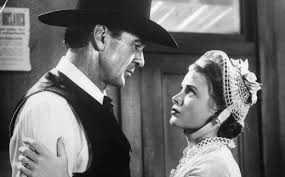
The drama of High Noon operates pretty much in real time and time itself as a motif is one which Zinnemann returns to over and over again during the 85-minute duration. Seldom will you see so many clock faces in a feature film. Tiomkin’s score also plays on this theme – the clock literally starts ticking from the moment that Will learns a former adversary of his named Frank Miller has been pardoned. His brother Ben and two others have been enquiring about the noon train. Deducing that the ruthless outlaw is on this train, the townspeople prevail on Will to quit the territory as quickly as possible. At first the recently retired Marshall complies. But then he turns back with his new bride and returns to Hadleyville. His sense of morality and obligation are much too steadfast to conceive of the idea of running – ‘They’re making me run,’ he explains to Amy, ‘I’ve never run from anybody before.’ Will’s reasoning that he ought to face Miller now, or forever be looking over his shoulder is absolutely sound, as is his assumption that the townspeople – his friends and cohorts – will stand with him. The first inkling he gets that this may not come to pass occurs as the judge who sent Miller up decides to leave in haste rather than face the vengeful criminal. ‘This is just a dirty little village in the middle of nowhere,’ he tells Will. The former Marshall soon perceives how other individuals also put their own personal interests ahead of any communal sense of duty. One of his deputies – Harvey Pell (Lloyd Bridges) – is simply peeved that Kane hadn’t recommended him for the job of Marshall. Another character tells his wife to lie on his behalf and she does so informing Will that he is at church. An attempt by Will to raise deputies in the local saloon is met with some jeering and smug laughter. The central character is effectively out on a limb. Unable to elicit assistance for himself, he is faced with a stark choice – flee and forever be ashamed; or fight and most probably die on a deserted street.
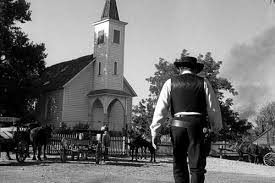
The drama which played out during the production of High Noon is well known to many a fan of this terrific film. Carl Foreman had been summoned to appear before the House Committee on Un-American Activities (HUAC) during the writing of the screenplay. Testifying that he had been a member of the American Communist Party some years before (which he had subsequently quit), he refused to provide the Committee with the names of other party members. He was labelled an uncooperative witness by HUAC and subsequently blacklisted. The supposition that High Noon is an allegory on blacklisting and McCarthyism in general is indeed well founded. Confronted by the implacable force that is Frank Miller and his gang, Will is also taken aback at how quickly the people he once defended turn their back on him. But he will not leave in spite of their indifference. Visiting a former lover named Helen Ramirez (Katy Jurado), Will affirms his own personal sense of obligation to stand and fight. ‘If you’re smart, you will get out,’ she tells him. ‘I can’t,’ he replies. Amy has also apparently abandoned him. Unable to understand why he would choose to remain on, she begins to grasp some of the reasons as to why Will and Miller were bitter rivals and why many of the self-interested townspeople practically welcome Frank Miller’s impending return. Much of the critical analysis regarding High Noon has centered on Foreman’s blacklisting and how it informs the overarching narrative, but another issue which the scriptwriter grapples with is the theme of big business and its influence on mindsets. When Amy asks the cynical hotel manager why he doesn’t like her husband, he replies that business was better when Miller was around. An ensuing scene at the Sunday Service hammers home this point even more emphatically. In one last desperate bid to engender assistance, Will appeals to the congregation – ‘I need all the special deputies I can get.’ The matter is debated at length and many voice their agreement that the former Marshall has served them well and ought to be backed in this moment of peril. But the voice of big business makes itself heard in no uncertain terms as the mayor of Hadleyville (Thomas Mitchell) addresses the spiritual gathering. Speaking out against the notion of a showdown, he cleverly remarks upon the politicians and investors who are contemplating funding for the prospering town by way of new stores and factories. The inference in his words is quite clear – we do not want this kind of trouble here as it would probably cause such powerful factions to look elsewhere. Such a scenario is one which he evidently does not wish to entertain. The force of his argument promptly sways the other citizens. Isolated once again, Will leaves the building in some disgust.
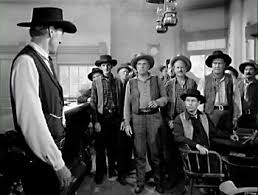
When Amy visits Helen Ramirez in her room, the latter criticises the young bride’s decision for not standing by her man. ‘What kind of woman are you?’ she asks Amy directly. The young Quaker explains that both her father and her brother were shot to death and this informs her religious tenets. When she attempts to understand Will’s motivation for facing Miller and his gang, Ramirez’s response is more pointed – ‘If you do not know, I cannot explain it to you.’ The strong woman of commerce – who was also once romantically involved with Frank Miller – can understand why Will deems his actions necessary, but she has little hope that he will survive. A realist and survivor herself, she informs Amy of her decision to leave on the very train which is bringing Frank Miller back to Hadleyville. Will too has his deep reservations regarding this and a notable scene involves him contemplating a quick getaway. Following a physical altercation with Harvey Pell, the former Marshall makes out his last will. A hanging clock ticks ever more loudly on the wall and Zinnemann presents us with a montage of the main and ancillary characters as they wait for the toll of 12. A train whistle is then heard in the distance. Walking out onto the main street of the town, Will watches as Amy and Helen go past on a wagon bound as they are for the station. The iconic shot of Gary Cooper – alone and devoid of allies – has quite rightly been hailed as one of the very best in cinema. As the camera rises and pulls away from him, the imminent danger to his person swells as does Tiomkin’s score. Faced with the inevitable gunfight, Will has already lost a battle and that is his personal one for the heart and soul of the town. He no longer knows these people; they have chosen to overlook his actions for them in the past. It’s an unmistakable form of denial. A renouncing of the individual who must now stand by himself.
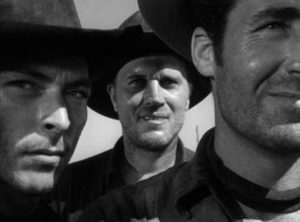
The critical gunfight sequence at the film’s end has been the subject of criticism in some quarters with respect to Amy’s sudden decision to rush to her husband’s defence. It may well smack of a volte face indeed, but it does serve a narrative purpose insofar that she is the sole character who seeks to help him. In more dramatic terms, Amy’s gunning down of one of Miller’s accomplices demonstrates the fact that she has finally come to understand Will’s rationale. Hadleyville is a much lesser community to his eyes now, but his penchant towards law and order dictates that he defend it nonetheless. His tossing of the Marshall’s star to the ground in the film’s final act exhibits contempt, but it also acknowledges that someone else must take up the cause. Hadleyville is, after all, civilisation. And civilisation will flourish by whatever means necessary.
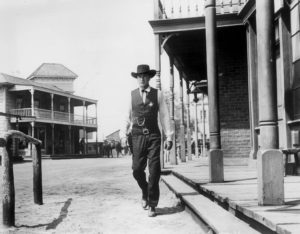
Regarded now as a classic in the genre (the American Film Institute placed it second after John Ford’s The Searchers in its list of top ten westerns of all time), High Noon was in its day scoffed at ever so slightly by audiences and critics who had come to expect stock elements such as gunfights, pursuits and panoramic images. Detractors complained about the lengthy speeches and inner musings which are such a feature of the film. Why all this incessant talk and lack of action they asked. Why does the hero feel such a need for help? Why does he despair so when such aid is not available? Fans of the western film to that point were used to their heroes resolving such difficulties with their dexterous skills and rapid-fire ability. High Noon was a distinct departure in this regard. It presented a character who is only too aware that he has overwhelming odds stacked against him. Past his physical prime as well, he realises his own limitations and mortality. He wants to live ultimately. Running away from Miller and his gang is no way of doing this as he tries to make Amy understand. Majestically shot by Floyd Crosby, High Noon is an introspective piece with regard to its subject matter and aesthetic quality. Rarely does the camera stray outside the confines of the town. In a similar fashion, the questions posed are immediate to the individual and most deeply felt. What is the right thing to do? How should the law-abiding man arrange his priorities? Beset by a number of physical ailments during the 31-day shoot (which included back pain and bleeding stomach ulcers), Gary Cooper perfectly captured the moral quandary which his character endures throughout the course of the film. Cooper won the Oscar for Best Actor for his performance (his second after Sergeant York) and golden statuettes were also awarded for Best Film Editing, Best Music Score and Best Song. A superb supporting cast includes Kelly, Mitchell, Bridges, Jurado and Lon Chaney Jr. With reference to its allegorical connotations, fellow actor, and longtime Cooper friend, John Wayne told an interviewer that he considered High Noon to be the, ‘most un-American thing I’ve ever seen in my whole life.’ So much so that it is often said Wayne and director Howard Hawks made 1959’s Rio Bravo as a response to the Zinnemann film. Hawks himself went on the record in this respect deriding the protagonist of the earlier film for running, ‘around town like a chicken with his head cut off asking everyone to help.’ Harsh words indeed, but we note with much satisfaction that the good people at the American Film Institute differed on this opinion. In the 2003 poll conducted by that body, Will Kane places at number 5 in the list of heroes. That’s higher than any other western cinematic character. A fitting accolade for a first-rate protagonist.